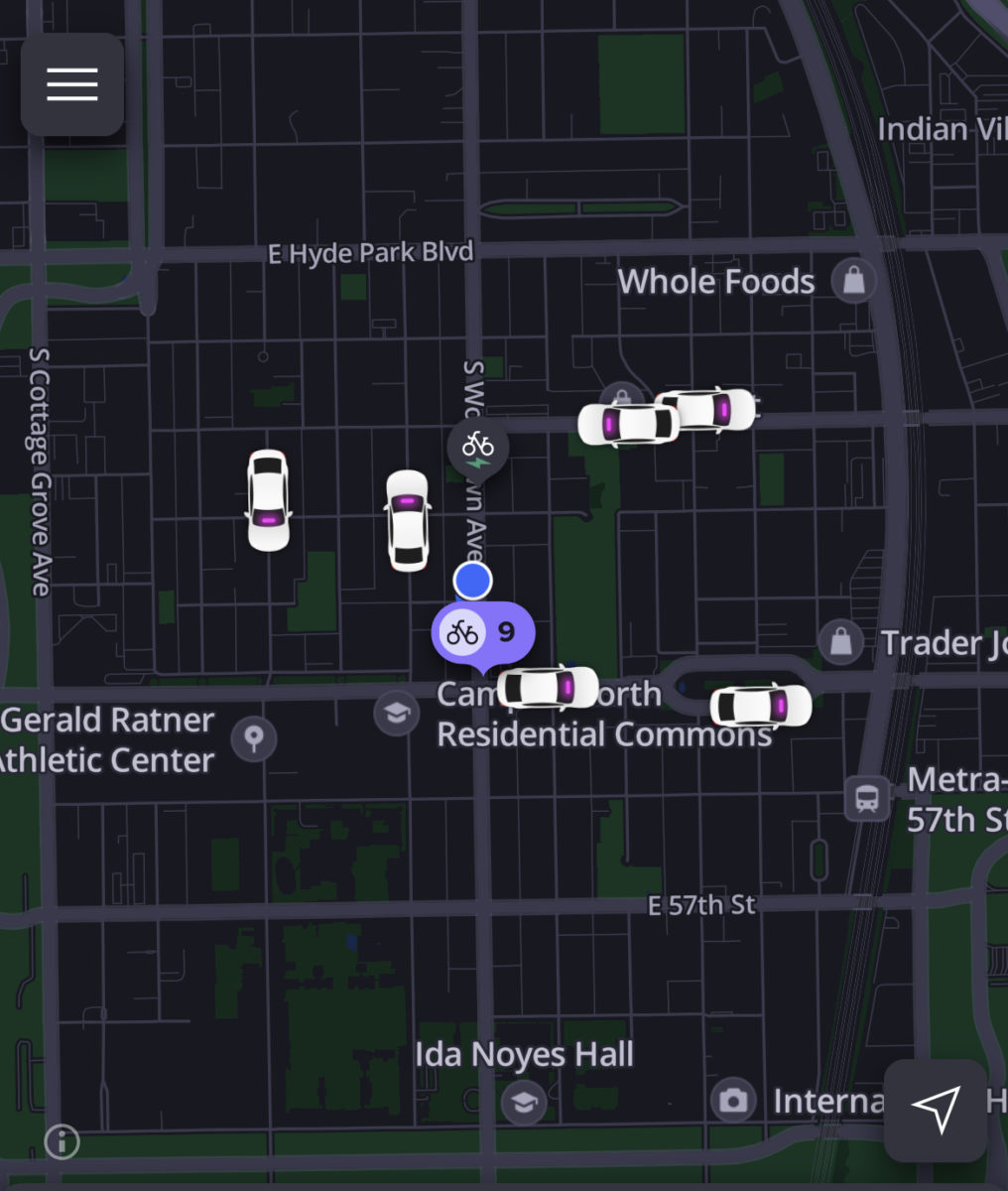Over the past three months, members of the UChicago Undergraduate Student Government (USG) have engaged in discussions with University officials regarding the possible replacement of the Lyft Ride Smart Program with Via, a shared point-to-point car service. The shift away from the Lyft program was first mentioned by University administrators during a Zoom webinar in late October 2023, prompting USG members to meet with UChicago Director for Transportation and Parking Services Beth Tindel to discuss the potential change.
Via, a company that provides digital infrastructure for shared point-to-point car services, has emerged as the most likely candidate to replace the existing Lyft program. According to Via’s website, “students can simply use their phone to book a ride.… The app also displays real-time ride status, so riders are constantly updated on ETAs and relevant service changes.”
Negotiations with Via are reportedly still in the early stages of development, and the University has not yet formally committed to the switch. “This would be something they’ll be interested in doing as soon as the next [academic] year,” said USG President Jefferson Lind.
In the interim, the existing seven-free-rides Lyft policy will remain for the rest of the academic year without any cuts or changes.
There are two major differences between Via and the existing Lyft program. Firstly, Via would be a shared ride service, meaning that each vehicle would carry more than one rider at a time in a similar manner as a shuttle. Secondly, unlike shuttles or Lyfts, Via vehicles would have no fixed route. Instead, the route of each Via vehicle would be based on real-time student requests.
“Say you wanted to go back to your dorm from the library. You would open an app on your phone and say, ‘I need a ride from the [Regenstein Library] back to Woodlawn.’ There may be someone on a similar route already, and that car will stop to pick you up and take you both to your respective locations,” Lind said.
Rather than relying on drivers who are employed by Lyft, Via eliminates Lyft as the third party and may allow the University to become more involved in the driver acquisition and management process. The increase in oversight would address concerns that University officials have raised about Lyft, namely “the influx of vehicles that [have] created a lot of challenges and concerns for our greater community.”
Additionally, Via could be integrated with UChicago’s existing transit system. “When you sign into Via, the app will also be able to show you if there is a shuttle coming to your location,” Lind said. The prospect of an integrated transit interface would advance the University’s goal of promoting usage of other campus transportation options.
Though still a small company, Via has established partnerships with several other colleges, including Northwestern, NYU, and Harvard. When asked about the efficacy of their programs, students from all three institutions praised Via for its user-friendly interface, but also noted the tardiness of the service. “For the most part people love it, but a big downside is that the cars are known to take 30–45 minutes to arrive,” Northwestern undergraduate Danielle Karr said in an interview with The Maroon.
Assuring the promptness of the ride share program is a major priority of USG’s advocacy. “A concern we brought up to Beth Tindel is that this needs to be a reliable service,” Lind said. “[She] told us that if they couldn’t find you a ride within [15] minutes, they would reroute you to a Lyft that [the University] would pay for. The idea that there is a Lyft backup baked in brought us some more comfort.”
While USG still prefers a return to the previous 10-free-rides Lyft policy, they maintain a “cautiously optimistic” stance towards Via. “[Via] would meet the same needs as the Lyft program, albeit slightly less convenient, but offer the same transit you can count on from point to point. When combined with the fact that there will be unlimited rides, it seemed like a worthwhile trade-off and better than the [7-ride] Lyft system we have now,” Lind said.
The University is also exploring alternative transportation options on campus, including improvements to the UGo shuttle system. “[University officials] have been adding more shuttles and more comprehensive shuttle routes for a long time…. However, supply chain issues have reportedly slowed progress,” Lind said. “While shuttle adoption is a good thing if it’s convenient for people, we don’t want it to be a reason why people aren’t able to Lyft anymore.”
Combining stagnation in shuttle improvements with downgrades in Lyft rides, Lind believes that “[the 2023–24 academic year] may be the most inconvenient year for UChicago students in terms of transport. Next year, we may see more convenient shuttle routes and a more reliable point-to-point service.”
USG continues to prioritize communication with both the student body and administrative officials. “The issue of Lyfts has been the primary focus of USG’s advocacy for the past six months,” Lind said. “We will continue to get these meetings and updates about shuttle developments and how negotiations about Via/Lyft alternatives are going. Knowing that this is where their enthusiasm is… we want to make sure that if the transition were to happen, those assurances they made to us would be realized: flexibility, unlimited rides, and free Lyfts after [fifteen] minutes.”
Editor’s note: A previous version of this article included quotes which contained an incorrect amount of time before the Via program would provide a user with a Lyft ride.















